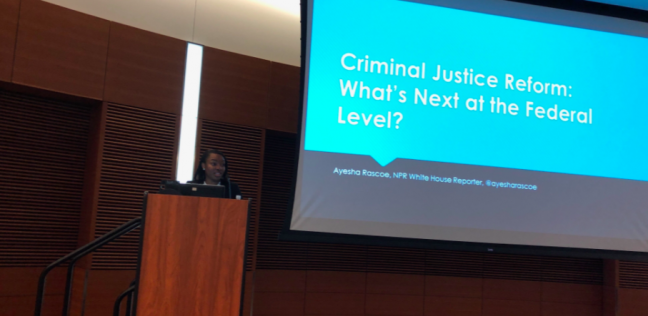Ayesha Rascoe, a White House reporter with National Public Radio spoke about how the First Step Act has lessened jail time for drug offenses and given more opportunities for supervised release.
The First Step Act is a recent law that focuses on prison reform through increased rehabilitation and training programs and sentencing reform through lessened minimum sentences by giving judges more discretion.
Rascoe focused on how lawmakers got to the First Step Act and what still needs to be done in terms of prison reform. Rascoe explained that the First Step Act was heavily supported by White House advisor Jared Kushner because of his personal connection with prison reform.
“[Jared Kushner’s] father, Charles Kushner, spent 14 months in federal prison in Alabama … this was something that was really kind of life-altering for him,” Rascoe said. “Because of that experience, he came into the White House very sympathetic to the plights of prisoners and also wanting to do something about this.”
Rascoe said Kushner gained support for prison reform from Evangelical politicians who saw it as redemption, as well as from conservatives who had been working on the issue for years. With this support, they were able to develop the original First Step Act.
With a focus on rehabilitation, the First Step Act lets prisoners earn more supervised release time — like house arrest — in exchange for attending training and rehabilitation programs.
Dane County takes steps forward to address issues within criminal justice system
Rascoe said the Act passed in the House of Representatives in May 2018, but many thought it didn’t do enough for prison reform because it did not address sentencing.
Kushner’s team struggled to get support for sentencing reform because of Attorney General Jeff Sessions’ firm “tough on crime” stance, Rascoe said.
“He really came from the school of thought that … the more people you lock up the safer we’ll be,” Rascoe said.
President Donald Trump has also stressed the importance of being tough on crime, however, once Sessions left, a “roadblock” was removed, Rascoe said. The First Step Act was then able to pursue sentencing reform as well.
The new version of the act, which was signed into law Dec. 21, included an end to the automatic life sentences for third drug felony offenses as well as a retroactive law that allowed people who were sentenced before the 2010 change in the crack cocaine versus powdered cocaine law to petition the court to lower their sentence.
The First Step Law received bipartisan support because many conservatives see mass incarceration as a “big government” issue and questioned its effectiveness, Rascoe said.
“Why are we locking all these people up?” Rascoe said. “We’re losing out on human capital and we’re spending all this taxpayer money and we’re not really benefiting from it, they feel like it was a conservative position, why should we have big government locking people up.”
Despite this support, Rascoe said there are also many critiques of the First Step Act. Some conservative politicians are worried it will let out criminals and cause the crime rate to go up, she said.
On the other hand, some liberals are concerned that the act will not do enough, Rascoe said. More specifically, many are concerned that the risk assessment tool, which decides whether or not prisoners are granted supervised release time, will disproportionately deem people of color as high risk.
Liberal groups have also pointed out that incentivizing training program attendance with supervised release time does not help prisoners serving life sentences, Rascoe said. Another concern those groups have is a fear that the First Step Act will not be implemented effectively.
“There is a concern that sometimes if you pass a bill and it doesn’t have enough in it … you won’t revisit this issue for 20 years,” Rascoe said. “There is also a concern that even if this is helpful so many people will be left behind that it wouldn’t be worth doing.”
But many groups see the next steps in criminal justice reform as addressing high bail costs, employment limitations for people with criminal records, and changing the pardons and commutations process, Rascoe said.
Rascoe ended the night describing the case of Matthew Charles, a man who was released from prison after serving 21 years but after two years out he was told his release was a mistake and was sent back.
Under the First Step Act Charles was able to petition and he was re-released this winter.
“There are 3,000 people like Charles who can now apply to reduce their sentencing and so that is what I think supporters of the First Step Act would say this was about, helping people like Charles,” Rascoe said.


















